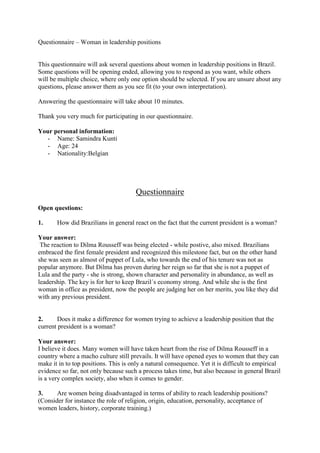
Interview sami
- 1. Questionnaire – Woman in leadership positions This questionnaire will ask several questions about women in leadership positions in Brazil. Some questions will be opening ended, allowing you to respond as you want, while others will be multiple choice, where only one option should be selected. If you are unsure about any questions, please answer them as you see fit (to your own interpretation). Answering the questionnaire will take about 10 minutes. Thank you very much for participating in our questionnaire. Your personal information: - Name: Samindra Kunti - Age: 24 - Nationality:Belgian Questionnaire Open questions: 1. How did Brazilians in general react on the fact that the current president is a woman? Your answer: The reaction to Dilma Rousseff was being elected - while postive, also mixed. Brazilians embraced the first female president and recognized this milestone fact, but on the other hand she was seen as almost of puppet of Lula, who towards the end of his tenure was not as popular anymore. But Dilma has proven during her reign so far that she is not a puppet of Lula and the party - she is strong, shown character and personality in abundance, as well as leadership. The key is for her to keep Brazil´s economy strong. And while she is the first woman in office as president, now the people are judging her on her merits, you like they did with any previous president. 2. Does it make a difference for women trying to achieve a leadership position that the current president is a woman? Your answer: I believe it does. Many women will have taken heart from the rise of Dilma Rousseff in a country where a macho culture still prevails. It will have opened eyes to women that they can make it in to top positions. This is only a natural consequence. Yet it is difficult to empirical evidence so far, not only because such a process takes time, but also because in general Brazil is a very complex society, also when it comes to gender. 3. Are women being disadvantaged in terms of ability to reach leadership positions? (Consider for instance the role of religion, origin, education, personality, acceptance of women leaders, history, corporate training.)
- 2. Your answer: Yes Brazil is still largely a society dominated by men. But there are signs of improvement and Dilma serves as the prime example. But the further emancipation of women will take more time. That said, origin is very important in Brazil. The difference between rich and poor in Brazil is enormous. A majority of Brazilians still lives under 300 euro a month. Consequently, as would go be the case in most other societies, the chances of women increase when born in a middle of upper class family. sMultiple choice (please put an ‘x’ in the box you would like to select): What factors influence the amount of women in leadership positions in Brazil most? Matters a lot Indifferent Does not matter at all 4. Religion X 5. Origin (where you come from) X 6. Network X 7. Schooling X 8. Woman being less qualified/skilled for leadership positions X 9. Getting children X 10.Maintaining family/ doing household duties X 11.Leadership (management) is conservative X 12.Discrimination X 13.Women are anxious to get success X 14.Women have a shortage of role models X 15.Laws on women in leadership make a positive difference X 16.Women are seen as followers, not leaders X 17.Women have a lack of long term commitment X 18.Men perceive women to have different roles in the society than leadership X 19.Women perceive themselves as not appropriate for the leadership position X 20.Men are viewing themselves as predetermined to be the leaders X 21.Women are viewing men as predetermined to be the leaders X 22.Women are being kept out of informal organizational networks X Open questions:
- 3. 23. Have you ever had a female superior or colleague? Your answer Yes female fellow students and female professors. 24. Did you have the feeling you were treated different/working together differently than with a male superior/colleague? Your answer Depending on the situation, or rather the female person at times yes, one would be less tolerant or more tolerant, more cooperative or less cooperative. But this as such would not be related the gender issue, rather to personality. The modus of working therefore would not be different as to male superior or colleagues. 25. What advantages could women in leadership positions bring? I think they would be more dynamic and thinking in the long term. Your answer 26. What do women need to do to achieve leadership positions? Your answer End of the questionnaire
